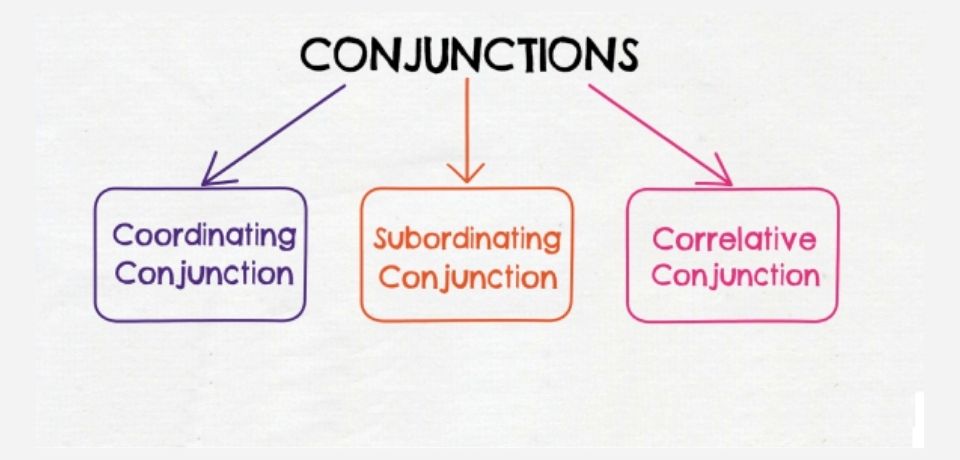A conjunction is a word that links words, phrases, clauses, or else sentences. Its examples include but, and, although, yet, since, unless, because, or, nor, while, where, etc.
With sentence examples:
She wanted to come, but could not due to her financial scarcity.
This is a beautiful tourist place and I have been there.
The elder son became a lawyer while the younger one a criminal.
You cannot achieve success unless you work hard.
Kinds of Conjunction:
- Co-ordinating
- Sub-ordinating
- Correlative
Co-ordinating Conjunction
It links together clauses of equal rank. For instance,
He is slow, but he is consistent.
In the above sentence, both clauses “He is slow” and “he is consistent” enjoy equal importance. As, they are in contrast, the conjunction ‘but’ links them
Another example:
He is helpless or he feigns helplessness.
There are two possibilities: (i) He is helpless; and (ii) he feigns helplessness. Since only one of them can be correct, we use the conjunctions or ….. either.
Sub-ordinating conjunction
This links together clauses in which one is dependent on other. For instance,
Since you want to be rich, you must start to work hard from now.
In the above sentence the conjunction ‘since’ links two clauses: (i) “you want to be rich” and (ii) “you must start to work hard from now”. Here one clause is dependent on the other clause (i) is the purpose of clause (ii) the main clause. Clause (i) is called as sub-ordinate clause.
Subordinating conjunctions are conjunctions which are used at the start of subordinate clauses. A number of examples of these conjunctions are; because, although, after, before, how, if, since, so that, until, unless, once, when etc.
Correlative Conjunction
These conjunctions work in pairs to correlate 2 parts of a sentence of equal importance. They are used in pairs to link two words, phrases or sentences. Either … Or: It is used to display choice between two things. e.g. Either Juhi or Pooja has revealed this secret.
A few regulations:
Regulation: Correlative conjunctions must be followed by the same part of speech.
Incorrect: The central government neither agreed to local citizens’ nor to state government’s petition.
In this sentence neither and nor are correlative conjunctions. What is neither followed by? Agreed, a verb. Then nor ought to be followed by a verb. However, we have only one verb. In this case, if we place neither after agreed then both the conjunctions will be followed by the same part of speech – preposition (to). Thus,
Correct: The central government agreed neither to local citizens’ nor to state government’s petition.
Regulation: Neither is followed by nor, not by or.
Incorrect: Mrs. Sharma neither worked in Delhi or in Mumbai.
Neither denotes n(ot) either. In the same way, nor means n(ot) or. Thus, when we apply the positives, we apply the either …. or pair. And for negatives, the neither …. nor pair. Thus,
Correct: Mrs. Sharma neither worked in Delhi nor in Mumbai.
Regulation: Conjunction that is not applied before
- A sentence in direct narration
- An interrogative pronoun or interrogative adverb in the indirect narration.
Incorrect: She said that, “The baby is growing young”
Note that the inverted commas refer to direct speech. The words within inverted commas (“”) is what he spoke. Hence, there is no need to of that in between.
Correct: She said, “The baby is growing young”
Incorrect: He asked that when I shall start my business.
When is an interrogative adverb and as per the rule, it should not be preceded by that? Thus, Correct: He asked when I shall start my business.
Regulation: Nothing else ought to be followed by but, not by than.
Incorrect: Nothing else could placate him after his mother’s bereavement than affection.
Correct: Nothing else could placate him after his mother’s bereavement but affection.
Regulation: Although goes with yet or else a comma (,) in the other clause.
Incorrect: Although India scored more than three hundred runs, but it lost the match.
Correct: Although India scored more than three hundred runs, yet it lost the match.
Regulation: The correlative conjunctions indeed ….. but are applied to emphasize the contrast between the first as well as second parts of the sentence.
Incorrect: I am indeed financially satisfied with my company, but it does give me sufficient holidays.
As per the regulation, but is used to emphasize contrast between the first and second parts of the sentence. For this, we should use not in either part of sentence to justify the application of but here. Hence,
Correct: I am indeed financially satisfied with my company, but it does not give me sufficient holidays.
Regulation: In a “not only … but also …” statement, the verb must agree with the noun or pronoun mentioned second, that is, the one after but also, since this is the part being emphasized.
Incorrect: Not only the employees but also the boss were responsible for the failure of this project.
The verb should agree with the boss since the emphasis of the sentence is on this part because it is placed after but also. For the reason that boss is in the singular number,
Correct: Not only the employees but also the boss was responsible for the failure of this project.
